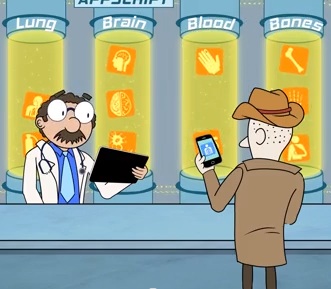Danbury, Connecticut-based IMS Health, a multinational big data and analytics company, has launched a health app prescribing platform this week called AppScript. IMS has already categorized and subcategorized more than 40,000 patient-facing health apps for Apple and Android devices, and it believes AppScript will be of interest to healthcare providers and health plans who want to create their own proprietary app formularies.
Many others have expressed interest in offering a health app prescription platform of some kind, including Happtique, HealthTap, WebMD, and Cigna. Many of these are still works in progress at best, while IMS Health's AppScript is launching fully baked.
Healthcare system CIOs have told IMS that they are interested in better understanding which apps are of interest to patients and which apps help them have better outcomes, IMS Health's Director of Consumer Solutions' Matt Tindall told MobiHealthNews on the sidelines of the mHealth Summit this week.
"AppScript allows providers to go in and look at a curated app store of 40,000 health apps along with which of these apps have efficacy data and -- over the long term -- which of these apps have actually produced outcomes."
IMS assessed those tens of thousands of health apps already based on functionality (including security), provider and patient reviews, certifications, and their potential to improve outcomes and lower the cost of care. As a result each health app from the two major AppStores now has an IMS Health AppScore assigned to it in the IMS offering, and developers do not need to pay IMS anything to get their apps into provider and payer formularies create via IMS's technology. The curated database of apps is not available directly to consumers at this time.
"There's a lot of experimentation in mobile health," IMS Health's SVP of Strategy & Global Pharma Solutions Stefan Linn told MobiHealthNews. "People are trying to do many different things, which is great, but there are also few rules in mobile health today, which makes it less safe. For mobile health to deliver on its promises it needs much more robust infrastructure."
Linn says that's where IMS comes in. By his reckoning IMS has a larger trove of healthcare data than any other company. It includes 10 petabytes of unique data, Linn said, which includes 400 million de-identified, multi-year patient journeys through various care settings. Their data was sourced from more than 100,000 sources around the world, Linn said. It also includes everything from claims data to prescription data and de-identified genomic information.
"We have thought a lot about the promise of apps," Linn said. "Why do we think it is so important? How engaged patients are with their care is the best predictor of their outcomes. The most engaged patients make the most informed decisions and tend to take better care of themselves. So, getting patients engaged has always been a goal of healthcare. New mobile technologies have the potential to ramp up patient engagement, but the apps need the right features and they need to get it into the hands of patients in a secure way, otherwise we are not going to get up that adoption curve."
With AppScript IMS Health will also be in a position to measure how prescribed apps effect outcomes that include data points like fewer patient visits, adherence rates, and other indicators that patients are performing better.
"We are experts in measuring outcomes and we think apps should be scrutinized like medications are," Linn said. "We can bring all this to the industry."
Tindall said that with AppScript IMS Health will be able to mash up data with its other data sets related to medication efficacy to find out which prescribed apps are having an effect on adherence rates. With enough data IMS could start suggesting that physicians prescribe a particular app if they are going to prescribe a particular drug, if IMS' analysis shows that historically patients have better outcomes on medication "x" when prescribed app "y" along with it.
"It is very early," Linn said. "This could be quite revolutionary in the way that it affects healthcare. Our business is around the measurement of healthcare and using technology and expert services to help [healthcare organizations] to act on that information. We have been looking at mobile health and concluded we have to be in the flow. We have to know this information. It will be accretive to our business over time."
IMS Health said it has been working with a number of pilot customers -- "big name medical centers" -- to help refine its iterations of AppScript. As part of the AppScript announcement, the company also launched a companion service called AppNucleus that aims to make it easier for health developers to create secure and better functioning apps. Providers can also use AppNucleus to create apps that include a secure physician-to-patient messaging plug-in, which the company is making available free to providers and for a fee to others.
"Physicians tells us they are writing 'app prescriptions' on napkins or from their own mobile devices," Tindall said. "Hospitals do not feel confident in the security of that. We are bringing order to an apps ecosystem that is currently an ocean of disorganization."
















